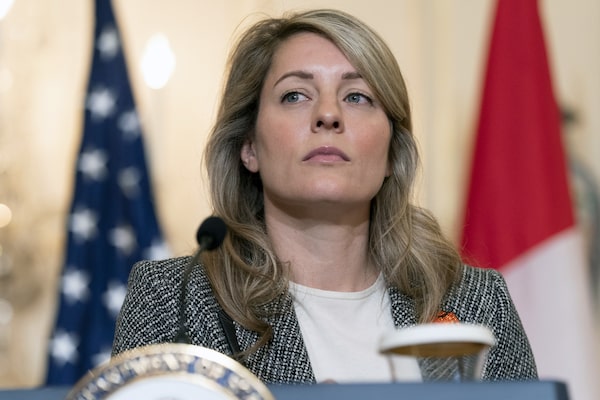
Canada's Foreign Minister Mélanie Joly attends a news conference with Secretary of State Antony Blinken, Sept. 30, 2022, at the State Department in Washington.Jacquelyn Martin/The Associated Press
Foreign Affairs Minister Mélanie Joly will unveil a long-awaited Indo-Pacific strategy on Sunday that promises to bolster the ability of national security agencies to combat foreign influence and disinformation campaigns in the region and in Canadian affairs.
Ottawa will provide nearly $230-million over the next five years to expand the capacity of Canadian intelligence and cyber security agencies to work closely with partners in the Indo-Pacific region and also to protect “Canadians from attempts by foreign states to influence them covertly or coercively,” according to the national security chapter provided to The Globe and Mail on Saturday.
The chapter said part of the money will go to detecting “cyber security threats originating in the region, including malicious activity targeting businesses, industry and infrastructure, and threats to democracy posed by online disinformation campaigns and surveillance technology, including online attacks targeting civil society and human rights defenders.”
China is not mentioned in this chapter, but in a Nov. 9 preview speech of the new Indo-Pacific policy, Ms. Joly called out Beijing as an “increasingly disruptive” global power in the region. She also vowed to boost efforts to fight meddling by foreign powers in Canadian affairs.
In a recent appearance before a Commons committee, Adam Fisher, director general of intelligence assessments at CSIS, warned that China is the “foremost aggressor” when it comes to foreign interference in Western countries, and that it works within their political systems to “corrupt” them. Mr. Fisher added that Beijing looks to “interfere domestically in all respects. That includes in certain elections and ridings.”
At the recent G20 summit in Indonesia, Prime Minister Justin Trudeau told Chinese President Xi Jinping of serious concerns about his country’s “interference” in Canada. Mr. Xi later berated the Prime Minister for releasing what he considered to be a private conversation.
Last week, Mr. Trudeau told the House of Commons “there are consistent engagements by representatives of the Chinese government into Canadian communities, with local media, reports of illicit Chinese police stations.” The RCMP is investigating reports China is operating more than 50 police stations including three in the Greater Toronto Area.
In a preview of the new policy earlier this month. Ms. Joly said Canada intends to diversify and deepen trade in the Indo-Pacific region, which stretches from North America to the Indian Ocean. But Ms. Joly said Canada must continue to trade with China, even though it is autocratic and increasingly assertive, because of the sheer size of its economy.
Ms. Joly said Ottawa will be vocal about China’s brutal treatment of Uyghurs and other Turkic minorities in the Xinjiang region, “where credible accounts of human rights abuses and crimes against humanity are well-documented.”
Canada will also continue to speak out about the crushing of free speech and the media in Hong Kong, oppose the escalation of Chinese military action against Taiwan and seek to “deepen our economic ties” with the self-governing island, she said. The notion of Canada pursuing stronger economic relations with Taipei is bound to be denounced by Beijing, which considers Taiwan to be part of China.
At the same time, Ms. Joly said Canada will co-operate with China on fighting climate change. It notes that the government is playing host in Montreal next month to the UN Biodiversity Conference, which is under a Chinese presidency.
The Chinese embassy in Canada has accused Ms. Joly of damaging China’s reputation. Her speech, it said in a statement on the embassy website, “contained a lot of negative contents related to China that distorted the truth, exaggerated the so-called ‘China threat’ and discredited China’s image, which constituted a gross interference in China’s internal affairs.”
The Canadian government has been quietly formulating its Indo-Pacific strategy since 2020. An early version drafted by Global Affairs bureaucrats this past summer made no mention of China. But Ms. Joly overruled her department and took a hands-on role in writing the strategy.
Goldy Hyder, president of the Business Council of Canada, said the government’s new policy is based on a “realistic assessment of risks and regional tensions, with a candid recognition Canada must continue to work with China on global priorities such as emissions reductions.”
 Robert Fife
Robert Fife Steven Chase
Steven Chase